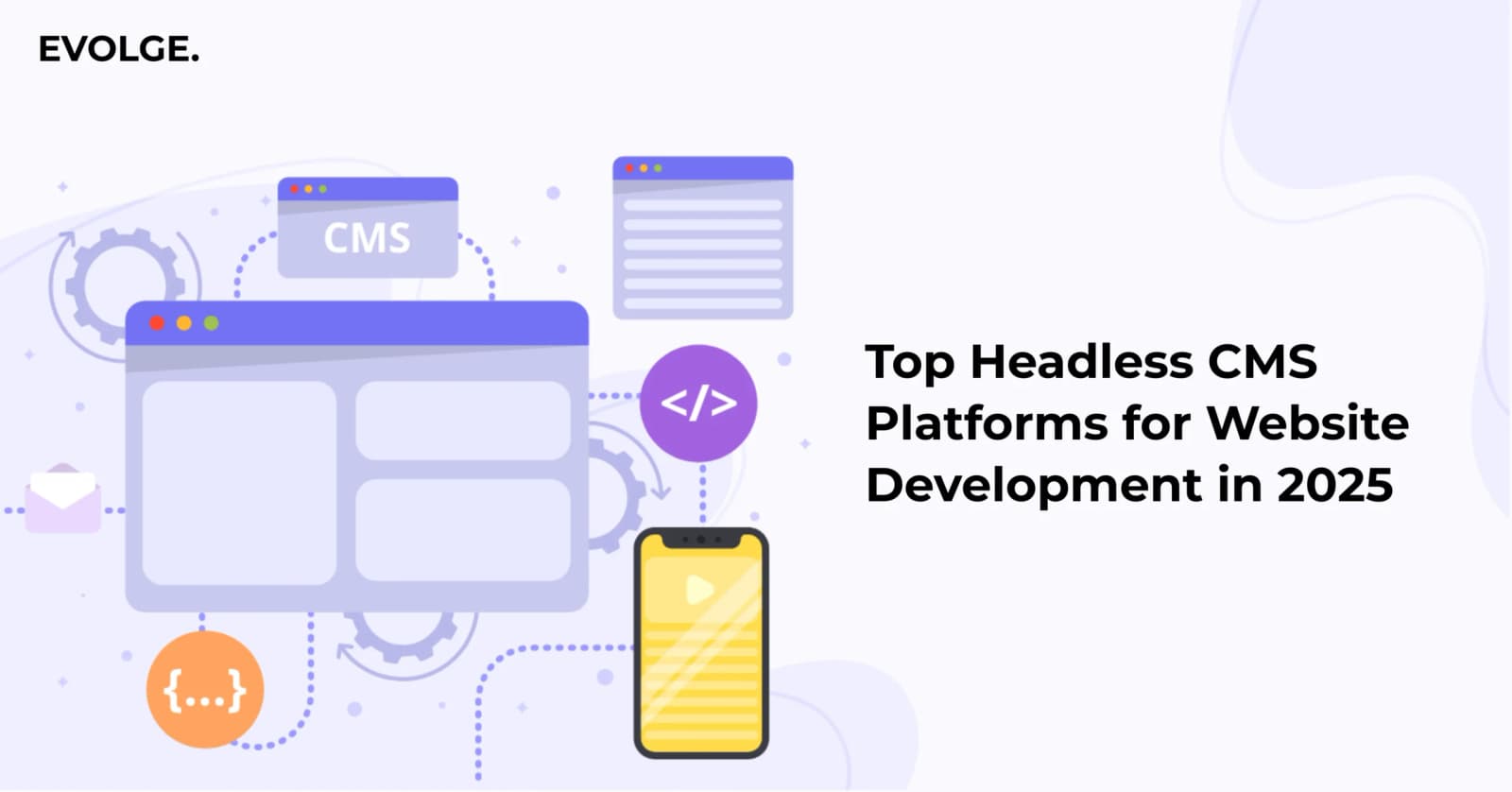Top 5 CMS Platforms for Your Website in 2025: Choose Smart, Scale Faster

Once a company switches to digital, its website serves as the hub for all things related to branding, marketing, and sales. A competent CMS, or content management system, is the brain behind every fantastic website.
Depending on the content management system (CMS) you choose for tasks like content updates and scaling e-commerce functionality, you can empower your team or limit their growth.
Through our custom web development services, Evolge has worked with hundreds of platforms, assisting startups and corporations in selecting the content management system (CMS) that best suits their requirements regarding current and future scalability, user goals, and business objectives.
Whether starting a blog, an e-commerce site, or a portfolio, this blog will walk you through the top CMS platforms with real-world features, advantages, downsides, and expert advice.
The Significance of Using the Appropriate Content Management System
Just picture yourself attempting to manage a restaurant out of a home-style kitchen. Choosing the wrong content management system (CMS) can feel like that; it can limit your flexibility, increase costs, and slow down your progress.
Here are some things that your CMS has an impact on:
- Positions in search results
- Efficiency and quickness of the website
- Safety and preservation of information
- Content and update publishing made easy
- The responsiveness and user experience
Our recent CMS transfer helped a Canadian food chain e-commerce website reduce page load time by 60%, improve product listing efficiency, and increase revenue through a more pleasant checkout UX.
1. WordPress – Most Versatile CMS Available
WordPress is unmatched in terms of worldwide appeal. Over 40% of the world’s websites are powered by this all-inclusive CMS, which began life as a blogging platform in 2003. WordPress’s open-source nature and robust plugin ecosystem make it suitable for a wide range of users, from solopreneurs and bloggers to multinational organizations.
WordPress’s strongest point is its adaptability. It is flexible enough to accommodate a wide variety of uses, including – but not limited to blogs, businesses, portfolios, and even online stores (with WooCommerce). Its large developer community guarantees updates, innovations, and third-party support.
Features:
- Fully accessible and open-source
- Over sixty thousand plugins for enhanced features
- Works with the WooCommerce e-commerce platform
- Devoted community backing and regular security patches
- Tools for scheduling material and blogging are integrated into
Pros:
- The design and backend are quite customisable.
- Comprehensive developer resources and online lessons
- Simple enough for newbies to use with a drag-and-drop theme
- Great for search engine optimisation using tools like RankMath or Yoast
Cons:
- Potential security risks due to improper maintenance
- With an excess of plugins, performance degrades
- Always needs to be backed up and updated
2. Shopify – Best CMS for Growing Your Online Store
Shopify is a top CMS platform for businesses that sell digital and physical goods. This e-commerce solution is cloud-based and completely hosted. Shopify is more than just a content management system; it’s an entire e-commerce platform with features like integrated payment processing and inventory management.
One thing that sets Shopify apart is how quickly it enables businesses to launch. With this solution, startups and expanding direct-to-consumer firms may scale without being bogged down by technical details. A fully functional online store with a stylish design, safe checkout, and mobile compatibility may be up and running in just a few short hours.
Features:
- Automatic backups and scalable hosting
- Integrated shipping and payment calculator
- Get 6,000+ extensions for Shopify in their app store!
- Mobile-friendly store builder with drag-and-drop functionality
- Recovery of abandoned carts and analytics for performance
Pros:
- Stable and protected hosting with SSL
- Marketing reports and tools that work together
- Great shop fronts can be built without knowing how to code
- Simple administration of products and monitoring of orders
Cons:
- Subscription and add-on fees each month
- It has less design flexibility than open-source content management systems and requires third-party programs to
provide sophisticated features.
3. Webflow: The Perfect Blend of Visual Design and Powerful Development
Webflow is a modern CMS that is quickly becoming popular, particularly among companies that value top-notch user interfaces and experiences (UI/UX) and design and marketing teams. Unlike traditional content management systems that rely on templates, Webflow gives you complete visual control without compromising performance or code quality.
Webflow stands out due to its hybrid character. A visual drag-and-drop builder is available for front-end design, and organised CMS Platforms for your website Design collections can be used for dynamic material such as blogs, case studies, or goods. Without knowing how to code, you can have the independence of a designer and the accuracy of a developer.
Features:
- Meta, alt, and schema SEO controls
- A visual tool for making pixel-perfect designs
- Safe, AWS-powered CDN hosting on a worldwide scale
- CMS database integrated for pages with abundant content
- Defaults to responsive design with user-defined breakpoints
Pros:
- Code output that is both clean and speedy
- Ideal for one-of-a-kind logos and animations
- Online content management and design suite
- Reduced development time due to code-free design
Cons:
- A little challenging for those who aren’t designers
- Not great for advanced online stores. Few options for third-party plugins
4. Magento – Enterprise CMS for High-Volume E-Commerce
One of the most potent and adaptable Best Web Development CMS Platforms for online stores is Magento, which Adobe Commerce currently owns. Thousands of goods, unique checkout processes, and complex multi-store systems are no problem for this scalable platform.
Magento shines when command, personalization, and integration are paramount, such as in enterprise-level operations or huge enterprises. Its support for both business-to-business and business-to-consumer e-commerce models makes deep personalization, customer segmentation, and process automation possible.
Features:
- AI-driven merchandise suggestions
- In a nutshell, ERP and CRM connectivity
- Software for managing products and orders that can be scaled
- The ability to work with various languages, currencies, and stores
- Personalized options for shipping, taxes, and promotional policies
Pros:
- Architecture that can be changed at will
- Maximum protection and restricted entry
- Designed for maximum efficiency and scalability
- Superb analytics and search engine optimisation resources
Cons:
- Changes must have developer support
- Expensive setup and ongoing maintenance fees
- Extended launch times compared to plug-and-play content management systems
5. Joomla – Organized, Secure, and Community-Focused
Joomla is an open-source CMS that is both powerful and flexible. While it lacks WordPress’s popularity, it provides extensive customization options for those seeking layered content, support for several languages, and robust access control.
Joomla’s dependability and security make it a popular choice among educational institutions, charities, and government agencies. It is perfect for complex, information-heavy websites because it allows many content categories, extensive categorization, and unique user rights.
Features:
- Module system for adaptable content
- Assistance with many native languages
- Integrated safety measures and add-ons
- User role-specific Access Control Lists (ACLs)
- Helpful search engine optimisation URLs and support for meta tags
Pros:
- Efficient load-bearing security
- This is a great option for sites with a lot of content and multiple authors.
- Excellent for portals that are community-driven or support several languages
Cons:
- Designed more for advanced users
- Less robust ecosystem than WordPress; fewer available layouts and plugins
| CMS | strongest For | Flexistrongility | SEO | Cost | Learning Curve |
| WordPress | Blogs, SMBs | High | High | Low | Easy |
| Shopify | Ecommerce | Medium | Good | Medium | Easy |
| Webflow | Creatives, Brands | Very High | High | Medium | Moderate |
| Magento | Enterprises | Very High | High | High | Hard |
| Joomla | Complex sites | High | Good | Low | Hard |
Final Thoughts
No one solution will work for everyone. Which CMS Platform for your website Design is best depends on your project goals, target audience, and desired level of customization.
We at Evolge Tech assist companies in sifting through the clutter to find a content management system (CMS) that does more than just function; it speeds up growth. As a Leading Web Development and Digital Marketing Agency, our professionals can help you with every step of website development, including choosing a platform to plan for future growth.
Ready to see the growth?
Contact us today and let’s scale your business!


